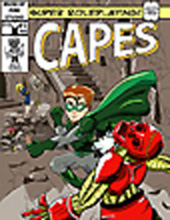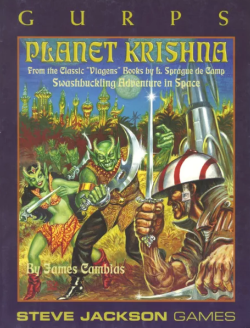Related Research Articles

A gamemaster is a person who acts as a facilitator, organizer, officiant regarding rules, arbitrator, and moderator for a multiplayer role-playing game. The act performed by a gamemaster is sometimes referred to as "gamemastering" or simply "GM-ing."

A role-playing game is a game in which players assume the roles of characters in a fictional setting. Players take responsibility for acting out these roles within a narrative, either through literal acting or through a process of structured decision-making regarding character development. Actions taken within many games succeed or fail according to a formal system of rules and guidelines.

RPGnet is a role-playing game website. It includes sections on wargames, tabletop games and video games, as well as columns on gaming topics.
The Storytelling System is a role-playing game system created by White Wolf, Inc. for the Chronicles of Darkness, a game world with several tabletop role-playing games tied in. The Storytelling System is largely based on the Storyteller System, the rule set used for White Wolf's older game setting, the World of Darkness.

Universalis, subtitled "The Game of Unlimited Stories", is a role-playing game (RPG) published by Ramshead Publishing in 2002 that stresses interactive storytelling. The game uses a unique system, based on "coins" that are used to make additions to the game, which allows the entire group to participate in the creation of the setting and events in play without a traditional gamemaster. The rules also provide a means of negotiating their own alteration, allowing for unlimited customization for play. The system is meant to support any possible genre.

An adventure is a playable scenario in a tabletop role-playing game. These can be constructed by gamemasters for their players, and are also released by game publishers as pre-made adventure modules. Different types of designs exist, including linear adventures, where players move between scenes in a predetermined order; non-linear adventures, where scenes can go in multiple directions; and solo adventures, which are played alone, without a game group.

The history of role-playing games began when disparate traditions of historical reenactment, improvisational theatre, and parlour games combined with the rulesets of fantasy wargames in the 1970s to give rise to tabletop role-playing games (TTRPGs). Multiple TTRPGs were produced between the 1970s and early 1990s. In the 1990s, TTRPGs faced a decline in popularity. Indie role-playing game design communities arose on the internet in the early 2000s and introduced new ideas. In the late 2010s and early 2020s, TTRPGs experienced renewed popularity due to videoconferencing, the rise of actual play, and online marketplaces.

De Profundis: Letters from the Abyss is a correspondence-based role-playing game created by Michał Oracz that was originally published by Polish game company Portal in 2001, then translated to English and published by Hogshead Publishing in 2002. Unusually, the game is not played via dialogue, but rather by the exchange of letters between players.

An indie role-playing game is a role-playing game published by individuals or small press publishers, in contrast to games published by large corporations. Indie tabletop role-playing game designers participate in various game distribution networks, development communities, and gaming conventions, both in person and online. Indie game designer committees grant annual awards for excellence.

Capes is a role-playing game by Tony Lower-Basch, independently published by Muse of Fire Games.

A diceless role-playing game is a tabletop role-playing game (TTRPG) which is not based on chance because it does not use randomizers to determine the outcome of events. The style of game is known as "diceless" because most TTRPGs use dice as a randomizer. However, some games use other randomizers such as playing cards instead of dice, and these are not considered "diceless."

Pantheon and other Roleplaying Games is a 24-page book that includes five self-contained role-playing games for 3-6 players and designed to be completed in 1–2 hours.

The Primal Order, or TPO, is a religion-based fantasy roleplaying game supplement. Of particular note, TPO was the first work published by Wizards of the Coast and its president, Peter Adkison. Through TPO, Wizards of the Coast introduced the "Capsystem" concept, enabling gamemasters to seamlessly integrate TPO and future Capsystem titles into other role-playing games.
Steve Wieck is best known as one of the founders of the publishing company White Wolf, Inc. He is also one of the original writers of Mage: The Ascension. Wieck is a co-founder of DriveThruRPG which later merged with RPGNow to become OneBookShelf. Wieck is currently the CEO of OneBookShelf.
The World of Darkness: Storytelling System Rulebook is a 2004 role-playing game supplement published by White Wolf Publishing for the World of Darkness.

GURPS Planet Krishna is a role-playing game supplement published by Steve Jackson Games (SJG) in 1997 that helps a gamemaster design a GURPS campaign using the Viagens Interplanetarias science fiction setting of L. Sprague de Camp.
Whimsy Cards is a 1987 role-playing game supplement published by Lion Rampant.

Legendary Lives Player's Primer is the first of two books published by Marquee Press in 1990 required for the role-playing game Legendary Lives.

Era Ten, subtitled "Sci Fi Role-Play", is a science fiction role-playing game (RPG) published by Better Games in 1990.

Triangle Agency is a satirical horror tabletop role-playing game about employees at a secretive and oppressive corporation. It has a metatextual instruction book written in the style of a company handbook. Triangle Agency was designed by Caleb Zane Huett and Sean Ireland. Haunted Table Games published it in 2024 after raising $379,602 on Kickstarter. Triangle Agency was inspired by the video game Control, the book House of Leaves, the movie The Matrix, and the TV show The X-Files.
References
- ↑ Breton, André (7 October 1948). "Breton Remembers". Archived from the original on 27 January 2008. Retrieved 30 September 2019. Exhibition catalogue, Le Cadavre Exquis: Son Exaltation, La Dragonne, Galerie Nina Dausset, Paris (October 7–30).
- ↑ Brotchie, Alastair; Mel Gooding (1991). Surrealist Games. London: Redstone Press. pp. 143–144. ISBN 1-870003-21-7.
- ↑ Kochhar-Lindgren, Kanta; Schneiderman, Davis; Denlinger, Tom (2009-12-01). The Exquisite Corpse: Chance and Collaboration in Surrealism's Parlor Game. U of Nebraska Press. ISBN 978-0-8032-2781-1.
- ↑ Brandreth, Gyles (1986). Everyman's word games. Dent. p. 76. ISBN 0460047116.
- ↑ Gascoigne, Marc (2007). "Once Upon a Time". In Lowder, James (ed.). Hobby Games: The 100 Best . Green Ronin Publishing. pp. 224–226. ISBN 978-1-932442-96-0.
- ↑ Wieland, Rob. "Darrington Press Brings For The Queen Back To Her Throne". Forbes. Retrieved 2024-08-13.
- ↑ Robinson, Tasha (2024-05-23). "For the Queen's creator on the new edition, her many copycats, and her balloon-kink RPG". Polygon. Retrieved 2024-08-13.
- ↑ Shannon Appelcline (2007). "A Brief History of Game #11: White Wolf, Part One: 1986-1995". RPGnet. Retrieved 2007-09-16.
- ↑ Shannon Appelcline (2007). "A Brief History of Game #12: White Wolf, Part Two: 1993-Present". RPGnet. Retrieved 2007-09-16.
- ↑ Jackson, Gita (14 August 2016). "How the Quiet Year Brings People Together". Kotaku.
- ↑ Robinson, Tasha (2021-03-30). "How handmade components put Fall of Magic on the map". Polygon. Retrieved 2023-04-01.
- ↑ Harrist, Josiah (2016-05-06). "Fall of Magic turns everyone into a gifted author". Kill Screen . Retrieved 2023-04-01.
- ↑ Spears, Jessica (2022-02-21). "Black History Month is for Gaming". American Library Association. Retrieved 2024-08-27.
- ↑ "Matrix Gaming Rules". Archived from the original on 2008-10-10.
- ↑ "Engle Matrix Games". Bloomingpedia.
- ↑ "Engle Matrix Games".
- ↑ "Places to Go, People to Be Issue 20: Co-operative Roleplay". www.ptgptb.org.
- ↑ "Ergo". Archived from the original on 2003-08-27.
- ↑ Bell, J B. "A review of Universalis at RPGnet".
- ↑ "The Diana Jones Award for Excellence in Gaming". www.dianajonesaward.org. Retrieved 2024-10-09.
- ↑ "Thoughtful Games - Montsegur 1244". thoughtfulgames.com. Retrieved 2024-10-09.
- ↑ Jensen, Frederik (2023-04-06). "The story of Montsegur 1244". Thoughtful Dane. Retrieved 2024-10-09.